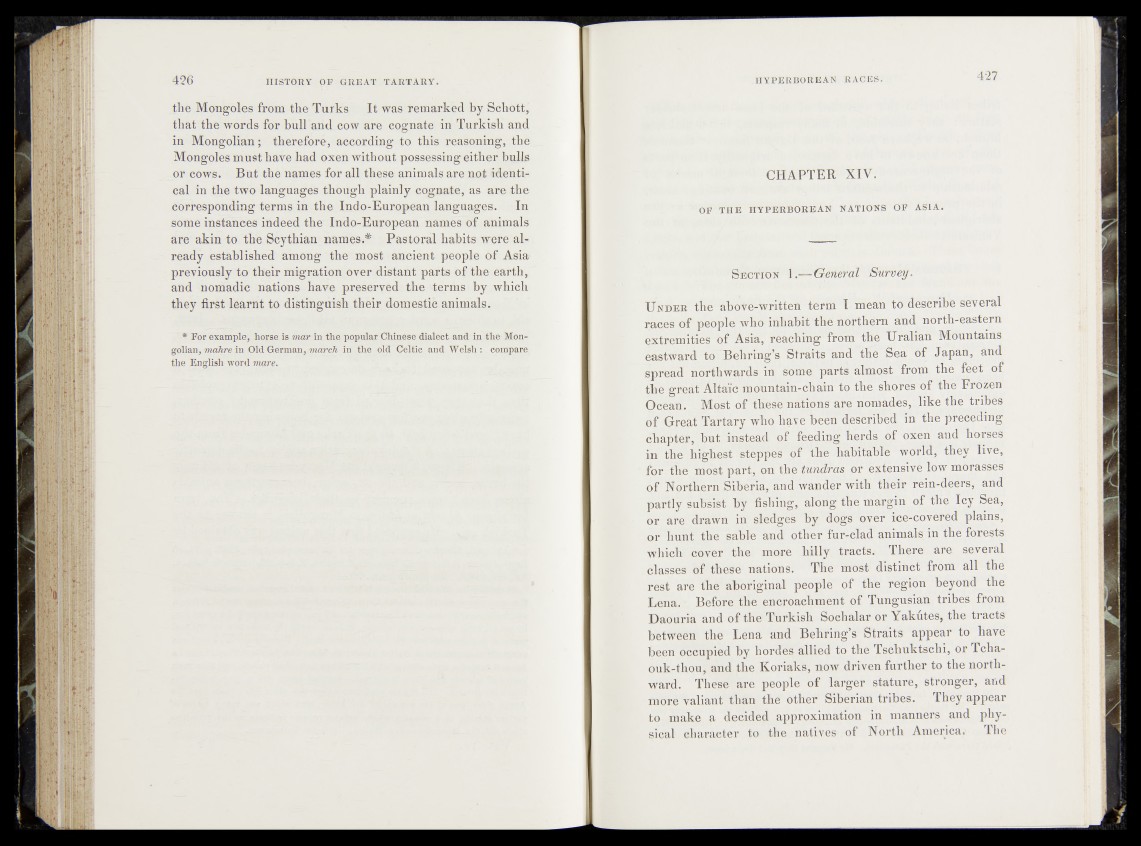
the Mongoles from the Turks It was remarked by Schott;,
that the words for bull arid cow are cognate in Turkish and
in Mongolian; therefore, according -to this-reasoning, the
Mongoles must have had oxen without possessing either bulls
or cows. But the names for all these animals are not identical
in the two languages though plainly cognate, as are tho
corresponding terms in the Indo-European languages. In
some instances indeed the Indo-European names of animals
are akin to the Scythian names.* Pastoral habits were alp
ready established among the most ancient people of Ask*
previously to their migration over distant parts of the earth,
and nomadic nations have preserved the '.terms by; which
they first learnt to distinguish their domestic animals.
* For example, horse is mar in the popular'JChui6se dialect and yilfhe* Mongolian,
mahre in Old German, march in the old Celtic ancLWelgla : compare^
the English word mare.
? CHAPTER XIV.
OF THE &ŸPERBOREÀN NATIONS OF ASIA.
Section 1 .—General Survey.
U n d e r tl^^aBp^-written term I mean to describe several
rapes of people who inhabit the ^brthérn and north-eastern
extremities of Âsia|: rtaching ‘from the Uralian Mountains
eastward to Behring’s Straits and 'the Sea of Japan, and
spread northwards in- sbme parts almost from the feet of
the gréât Altaic mountain-cnaih'TO^ the shoreâhf the Frozen
Ocean. JVfclfifthesSnations are nomàdÆlik^he tribei
of Great Tartary who havé%îen‘die ^ ^ « i r i J thê’^réceding
chapter, but'instead of feeding h e r e o f oxén and ^ r ’se's
éËffffïe highesf^^^pi^K of the liàbitatle world, they live,
for the & s t part, on thxetundras orsexfensivg3wmorasses
i f Northern Siberia, and wander with t f t r rein-deers’, and
pârlly subsist by fishing^'along the margi^ p f the Icy Sea,
or are drawn in sledges by d*o^è over i’ce-coyered plains,
or hunt the sable and other fur-clad animah in the forests
which cover the more hilly tracts. There are; several
clasâê’ÿvof these- nations. The m'cTât distinct from all the
rest are the aboriginal peopl# 'of the r|gi6n^' beyond the
Lena.v Before the encroachme^pf Tungusian, tribes from
Daouria and of the Turkish Sochalar or YakuteS^fthe tracts
between the Lena and Behring s Straits appear to have
been occupied by hordes allied to the Tschuktschi, or Tchà-
ouk-thouy and the KoriakS; now drivbhifurther to the northward.
These are/people of larger stature, stronger, and
more valiant t'bân1 the1 other Siberian tribes. They appear
to make a decided approximation in manners and physical
character to the natives- : of North America. The